
The Ultimate Business Travel Guide to Morocco: What Every Professional Needs to Know
As the gateway between Europe, Africa, and the Middle East, Morocco stands out as a strategic business hub with immense potential. The country has seen rapid infrastructure development, ongoing economic reforms, and a growing reputation as a magnet for international investors and global entrepreneurs. From thriving industrial zones to a blossoming startup ecosystem, Morocco has positioned itself as a forward-thinking destination for business professionals seeking opportunity, innovation, and strategic location advantages.
This guide is designed for:
- Business travelers attending conferences, negotiations, or trade expos
- Entrepreneurs exploring new ventures in North Africa
- Investors and corporate delegates evaluating Morocco as a market or base of operations
Whether you’re preparing for a high-stakes meeting in Casablanca or scouting investment opportunities in Tangier, this guide will equip you with the essentials from visa requirements and legal support to where to dine and network with Morocco’s elite business community.
Entry Requirements & Business Visas
Before planning your business trip to Morocco, it’s crucial to understand the country’s visa requirements and application process. Morocco offers a relatively straightforward system for business travelers, with several options depending on your nationality and the nature of your visit.
A. Visa Types for Business Travelers
- Business Visa (Short-Stay)
Typically valid for 30 to 90 days, this visa allows foreign nationals to attend meetings, trade shows, and conduct business-related activities. - Multiple-Entry Visa
Ideal for frequent business travelers, this visa can be issued for 6 months to 1 year, depending on the applicant’s profile and supporting documents. - Visa Exemption
Citizens of many countries including the UK, EU nations, the US, and several Gulf countries do not require a visa for stays up to 90 days for business or tourism purposes. Always confirm your status via the Moroccan Ministry of Foreign Affairs.
B. Required Documents
Applicants generally need to submit:
- A valid passport (with at least 6 months before expiry)
- Completed visa application form
- Letter of invitation from a Moroccan company or business partner
- Proof of accommodation (e.g., hotel reservation or company-provided housing)
- Flight itinerary
- Proof of financial means (such as bank statements or a business sponsorship letter)
- Two passport-size photographs
C. Application Process & Processing Times
- Apply through the nearest Moroccan consulate or embassy in your country.
- Standard processing takes 5–10 business days, but it’s advised to apply at least 3–4 weeks in advance.
- Express services may be available for urgent travel, depending on the consulate.
D. Useful Government Portals and Contact Points
- www.consulat.ma – For visa forms, consulate locations, and requirements
- www.diplomatie.ma – Ministry of Foreign Affairs for diplomatic matters
- Embassy websites – Many provide downloadable forms and appointment scheduling
- E-Visa platform (in development for broader international rollout)
Where to Get Business Documents & Official Support
Navigating Morocco’s business environment is straightforward with the right guidance. Whether you’re registering a company, seeking investment incentives, or looking for startup support, these institutions and platforms will be your go-to resources.
A. Key Government Organizations
- Moroccan Investment and Export Development Agency (AMDIE)
The primary body for foreign investors. AMDIE offers project guidance, investment facilitation, and detailed sector studies.
www.amdie.gov.ma - Office des Changes
Regulates foreign exchange operations and provides rules on fund repatriation, capital transfers, and foreign account setup.
www.oc.gov.ma - Regional Investment Centers (CRI)
Located in every major region, these one-stop shops assist with company formation, permits, and tax advice.
Services include expedited business registration, building permits, and local incentive programs.
www.cri-invest.ma - Chambers of Commerce, Industry, and Services
Provide market insights, B2B connections, and event calendars for networking and trade expos.
Regional branches also support foreign partnerships and joint ventures. - Ministry of Foreign Affairs
Handles diplomatic coordination, supports bilateral agreements, and facilitates high-level corporate diplomacy.
www.diplomatie.ma
B. Online Portals
- www.casainvest.ma – Investment information for Casablanca-Settat region
- www.amdie.gov.ma – National investment promotion
- www.ompic.org.ma – Moroccan Office of Industrial and Commercial Property; essential for trademark registration, legal status verification, and online business registry services
C. Business Incubators & Accelerators
Morocco has a growing ecosystem of incubators and tech accelerators that support innovation-driven startups and SMEs.
- Technopark (Casablanca, Rabat, Tangier)
Offers co-working spaces, mentorship, and access to public and private funding. - LaFactory (Casablanca)
A premier innovation lab connecting startups with corporate partners through hackathons and open-innovation challenges. - StartUp Maroc & Impact Lab
Programs providing acceleration, seed funding, and connections to angel investors and venture capitalists.
These platforms can help foreign entrepreneurs plug into Morocco’s fast-growing tech and innovation ecosystem.
Top Cities for Business Travel
Each of Morocco’s major cities offers a unique business landscape, shaped by its economic strengths, infrastructure, and strategic location. Whether you’re closing deals, attending expos, or scouting partnerships, these cities are at the heart of Moroccan commerce.
A. Casablanca – Morocco’s Business Capital
As the country’s financial and industrial epicenter, Casablanca hosts the headquarters of major banks, corporations, and multinationals.
- Casablanca Finance City (CFC) offers a competitive platform for international investors targeting Africa.
- Home to Morocco’s stock exchange, the CFC Tower, and a cluster of tech startups.
- Key business venues: Casablanca Technopark, Oasis Business Center, Palais des Congrès.
- Well-connected by Mohammed V International Airport and high-speed rail (Al Boraq).

B. Rabat – Administrative and Diplomatic Hub
Morocco’s capital is the center of government, embassies, and international organizations.
- Ideal for those involved in policy, diplomacy, or public-private partnerships.
- Hosts many NGOs, international development agencies, and think tanks.
- Modern districts like Hay Riad offer Class A office space and proximity to ministries.
- Business-friendly atmosphere with a quieter, more structured pace than Casablanca.
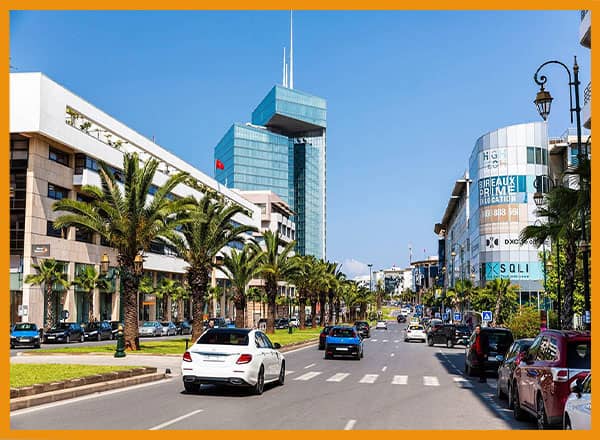
C. Tangier – Gateway to Europe and Free Zones
Strategically located at the Strait of Gibraltar, Tangier is a logistics and manufacturing powerhouse.
- Tangier Med Port is Africa’s largest container port, offering seamless access to global markets.
- Tangier Free Zone and Automotive City attract heavy industry, automotive giants, and exporters.
- Growing expat community and excellent logistics make it attractive for international operations.
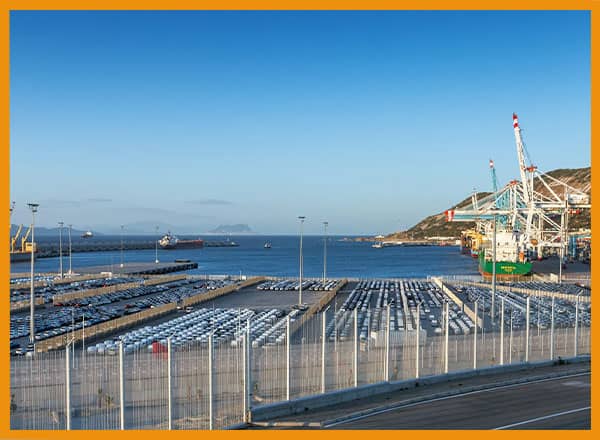
D. Marrakech – MICE and Luxury Business Events
While famous for its tourism, Marrakech is also a hotspot for international conferences and incentive travel.
- World-class venues like Palais des Congrès and luxury resorts cater to MICE (Meetings, Incentives, Conferences, Exhibitions) tourism.
- A favorite for corporate retreats, brand launches, and investor networking events.
- Offers a blend of culture and commerce, with easy weekend escapes into the Atlas Mountains or Agafay Desert.
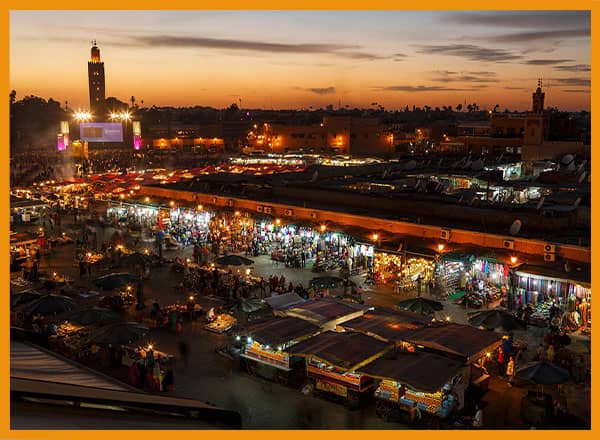
A. Social Norms in Moroccan Business Culture
- Politeness and Respect are essential. Begin meetings with a firm handshake and greetings in French (“Bonjour”) or Arabic (“Salam Alaikum”).
- Titles Matter – Use professional or honorific titles (e.g., Monsieur, Madame, or Doctor) unless invited to use first names.
- Modesty in Dress – Men should wear suits; women should dress modestly and professionally. In more conservative cities, avoid overly casual or revealing attire.
B. Meetings & Communication
- Appointments should be made in advance, ideally confirmed the day before. Punctuality is appreciated, although slight delays are common and usually tolerated.
- Meetings may start with informal conversation, don’t rush into business; allow for personal rapport.
- Negotiations can be lengthy and indirect. Be patient, diplomatic, and willing to revisit terms multiple times.
- French is widely used in business. Arabic is the national language, and English is gaining popularity, especially in younger professional circles.
C. Gift-Giving & Hospitality
- Gifts are not expected but appreciated, particularly if they represent your home country or company.
- If invited to a Moroccan’s home, bring sweets or flowers never alcohol unless you are sure it is welcome.
- Tea, especially mint tea, is a symbol of hospitality. Accepting it is a respectful gesture and often part of early business interactions.
D. Religion & Cultural Sensitivity
- Fridays are holy days; avoid scheduling important meetings during Friday noon prayers.
- Be aware of Ramadan (dates vary yearly). Business hours may shift, and dining in public during daylight hours should be avoided out of respect.
- Avoid discussing sensitive topics like politics or the monarchy unless the counterpart brings it up.
A. Co-Working Spaces & Business Centers
- Major cities like Casablanca, Rabat, and Marrakech offer modern co-working spaces equipped with high-speed internet, meeting rooms, and flexible office setups.
- Popular options include:
- WorkHub (Casablanca)
- The Spot (Rabat)
- Cowork in Marrakech
- Technopark (in multiple cities) – geared toward startups and tech firms
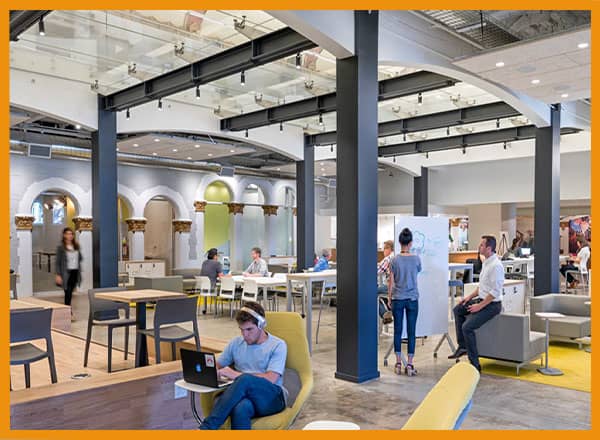
B. Corporate Transport Options
- Private car hire with driver is recommended for business meetings and airport transfers, widely available through hotels or apps.
- Ride-hailing apps like, Heetch, operate in major cities and are more reliable than traditional taxis.
- Al Boraq high-speed train connects Casablanca to Tangier in just over 2 hours, offering business-class comfort and onboard Wi-Fi.
- Casablanca and Rabat tram systems offer convenient urban transit for daily commuting.
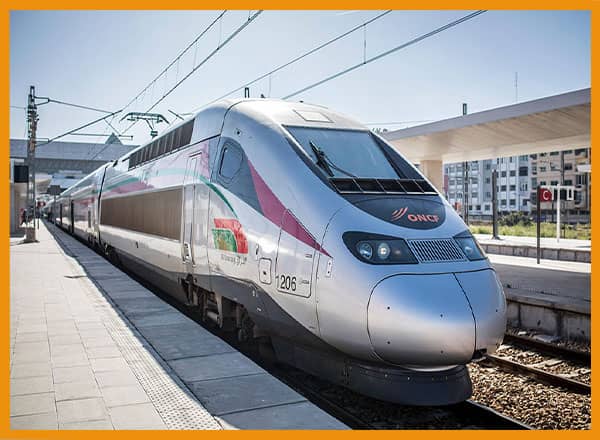
C. Mobile & Internet Services
- Morocco has a robust mobile network, with 4G widely available and 5G rolling out in select areas.
- Top providers: Maroc Telecom, Orange, and Inwi – all offer tourist and business SIM cards with generous data packages.
- Free Wi-Fi is common in business hotels, cafes, airports, and co-working spaces.

D. Digital Tools & Business Apps
- Translation: Google Translate, Microsoft Translator (Arabic/French/English support)
- Navigation & Ride-hailing: Google Maps, Heetch
- Business Tools: WhatsApp (widely used for informal communication), Zoom, Google Workspace, and Microsoft Teams are all popular and supported.
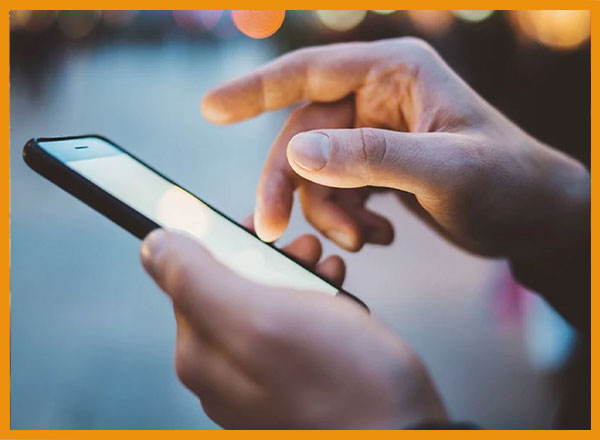
Safety, Security & Legal Tips
While Morocco is generally a safe and stable country for business travelers, staying informed about safety practices and legal norms is essential to protect yourself and your business interests.
A. Personal Safety
- Stay aware of your surroundings, especially in crowded places like markets and public transport. Petty theft, such as pickpocketing, can occur.
- Use hotel safes to store valuables, passports, and business documents.
- When using taxis or ride-hailing apps, confirm the driver’s identity before entering the vehicle.
- Avoid walking alone late at night in unfamiliar or poorly lit areas.
B. Protecting Your Business Interests
- Ensure all contracts and agreements are reviewed by a local legal expert familiar with Moroccan law.
- Register your trademarks and intellectual property with OMPIC (Moroccan Office of Industrial and Commercial Property).
- Be cautious of unofficial intermediaries or “fixers” who may promise expedited services and always use official channels.
- Understand the local labor laws if hiring staff or contractors.
C. Common Scams to Watch Out For
- Overpriced or counterfeit products, especially in tourist areas.
- “Friendly” strangers offering unsolicited help or guides asking for large fees.
- Fake business opportunities or investment schemes; verify legitimacy before committing funds.
D. Where to Get Help
- Local police (Police Nationale): Emergency number 19 or 112 on mobile phones
- Tourist police: Available in major cities and tourist spots, can assist with safety concerns
- Embassies and Consulates: Contact your country’s diplomatic mission for emergencies or legal assistance
- Legal advisors: Many international law firms and local attorneys specialize in business law
Combining Business with Leisure (Bleisure Travel)
Morocco offers a fantastic opportunity to blend work with relaxation, making it an ideal destination for bleisure travelers. After closing business deals or attending conferences, you can unwind and explore the rich culture, scenic landscapes, and luxurious experiences nearby.
A. Easy Escapes Near Business Hubs
- From Casablanca: Take a day trip to the historic city of El Jadida or the charming Oualidia Lagoon for beach and seafood delights.
- From Rabat: Visit the ancient ruins of Chellah, stroll along the Bouregreg Marina, or explore the nearby town of Salé.
- From Tangier: Explore the coastal beauty of Asilah, or take a short ferry to Tarifa, Spain for a quick international excursion.
- From Marrakech: Venture into the Atlas Mountains for hiking, or relax in the Agafay Desert with luxury camp experiences.
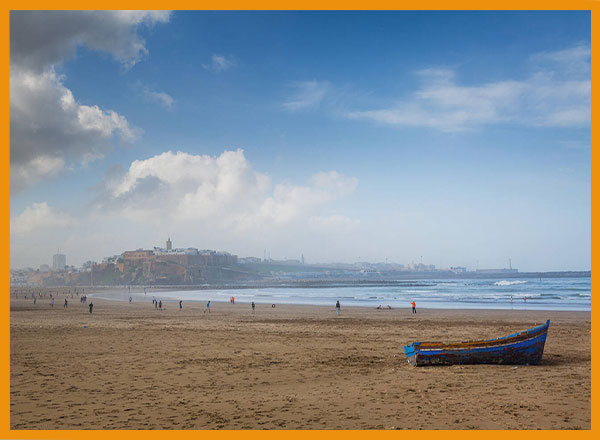
B. Golf Courses & Luxury Experiences
- Morocco boasts some world-class golf courses perfect for business networking or leisure:
- Royal Golf Dar Es Salam (Rabat)
- Assoufid Golf Club (Marrakech)
- Golf de Mogador (Essaouira, near Marrakech)
- Casa Green Golf Club (Casablanca)
- Spas & Wellness: Many upscale hotels offer traditional Hammams, massages, and wellness treatments ideal for stress relief after a busy schedule.
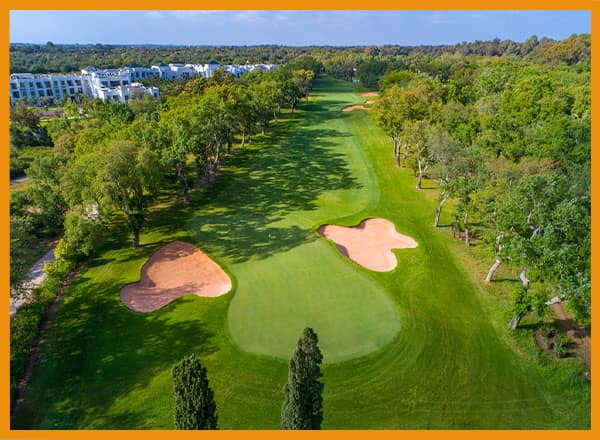
C. Cultural Experiences
- Attend a traditional Moroccan cooking class or food tour in major cities.
- Experience live music and dance performances, especially Andalusian or Gnawa styles.
- Explore souks and artisan workshops for unique souvenirs and insights into Moroccan craftsmanship.
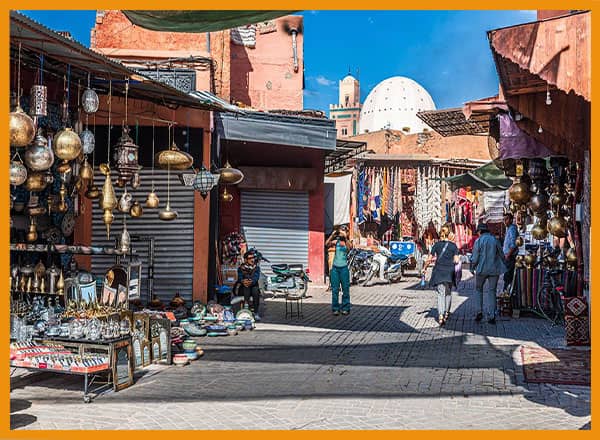
Final Tips & Checklist for Business Travelers to Morocco
To ensure your business trip to Morocco runs smoothly, keep this checklist and set of recommendations handy.
A. Business Packing List
- Valid passport with necessary visas
- Copies of business invitations and registration documents
- Business cards (preferably bilingual: English/French or Arabic)
- Power adapters (Morocco uses Type C and E plugs, 220V/50Hz)
- Comfortable yet professional attire, including modest options
- Mobile phone with international roaming or local SIM card
- Laptop/tablet and chargers
- Portable Wi-Fi hotspot or SIM with data plan
- Basic medical kit and any prescription medications
B. Recommended Apps
- Translation: Google Translate, Microsoft Translator
- Transport: Heetch, Google Maps
- Currency: XE Currency Converter, Revolut (widely accepted prepaid card)
- Communication: WhatsApp, Zoom, Microsoft Teams
- Local News & Updates: Morocco World News, The Moroccan Times
C. Emergency Contacts
- General emergency: 19 or 112 (mobile)
- Tourist police: Available in major cities
- Your country’s embassy/consulate: Save the phone numbers and addresses before travel
- Local medical facilities: Know the nearest hospital or clinic to your accommodation
D. Additional Tips
- Confirm all appointments in advance and keep contact numbers handy.
- Always carry some local currency (Moroccan Dirham – MAD) as not all places accept cards.
- Be respectful of cultural customs, especially during Ramadan or religious holidays.
- Stay informed about local news and travel advisories.
- Use official taxis or recommended ride-hailing apps for safety.
